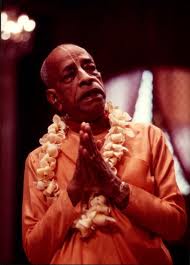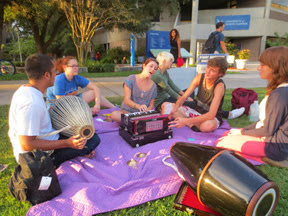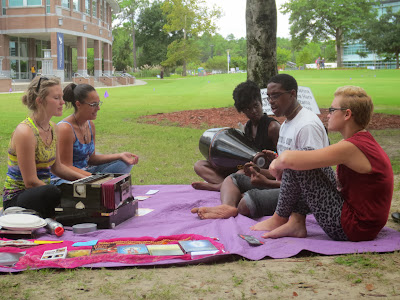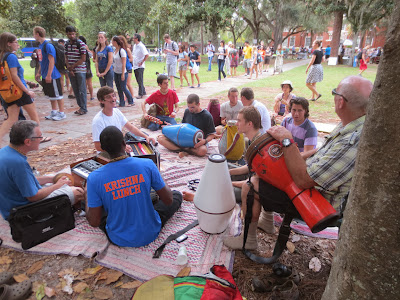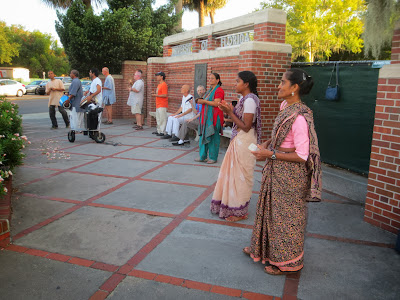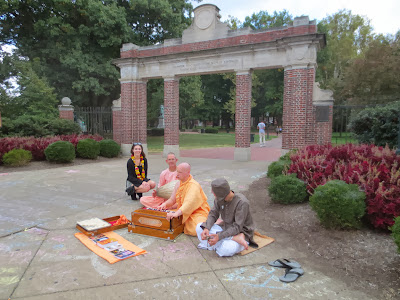SB 02.04.15 Decorated Cell 2013-07-28 Timisoara
Lecture – SB 2.4.15 Decorated Cell 7/28/2013
Chanting Is The Prime Necessity
→ Japa Group
Unlimited purity
→ KKS Blog
(Kadamba Kanana Swami, 13 September 2013, Durban, South Africa, Radhastami)
 Here in this world, we are all limited by karma. Some of us have a nose that is too big. Some of us have ears that stick out too much. Some have eyes that are too sunken. Some have bags under the eyes. Some have puffy cheeks and so on. There is no limit to the imperfection that we face as a result of our previous sinful activities.
Here in this world, we are all limited by karma. Some of us have a nose that is too big. Some of us have ears that stick out too much. Some have eyes that are too sunken. Some have bags under the eyes. Some have puffy cheeks and so on. There is no limit to the imperfection that we face as a result of our previous sinful activities.
These are the reactions due to our impurity and therefore we have the bodies that we have but Srimati Radharani’s appearance is perfectly reflecting her unlimited purity and her pure love for Krsna.
Wednesday, October 9th, 2013
→ The Walking Monk
Toronto/Vancouver
Michael Cremo is the author along with Dr. Richard Thompson on writings that challenge the status quo including the self-admitted speculations of Darwin. “Forbidden Archaeology” and “The Hidden History of the Human Race” are books inspired by our guru that are premised by conspiracy theory justified. When you read these revealing texts, you’ll know what I mean. Why do people blindly follow anything that’s presented to them? Why the gullibility? Challenge or at least question before acceptance, be thoughtful.
That’s what’s nice about Cremo’s work, it stimulates independent thinking. He travels the world with his message and shakes up a paradigm that needs shaking. And he presents the facts with coolness and sobriety.
It’s unfortunate that I won’t be around for his talks. I’m off to Vancouver today and he’ll be moving about in the Toronto/Hamilton area enlightening people, ‘shaking a few trees’.
Cremo, whom I know devotionally as Drutakarma, came out with me for that chill out trek that I take in the morning. Conversation was light, we were just getting to know each other. In exchange, we asked, ‘Where were you born? Where did you grow up? What’s your ethnicity?’ and so on.
And so long… On the plane I go.
By providence I was moved from a middle seat to the isle and the young fellow two seats from mine was also moved from the middle row to the window. We hit it on. As he put it, it was meant to be. Sam Hing is a Toronto born guy of parents from Hong Kong. He was raised Catholic, and during mass he served as an “Well, you can’t say it anymore, an altar boy, because of the gender thing,” he said in a whisper. He is a strong spiritualist advocate and less so a backer or religion.
People do sometimes ask, “Is yours a religion?” This was a similar assumption made by Raymond, an early seeker to the movement in New York, when he asked, “In your religion…” Our guru, Srila Prabhupada, cut him off sharply.
“This is not religion, this is knowledge.”
In any event, Sam is a great guy who seemed to understand my lifestyle as a traveller, a sannyasi, a monk who likes to be out and about. We conversed about a troubled world and the lack of RESPECT (Aretha) and what that word means. ‘Re’ means ‘again’, ‘Spect’ means ‘look’. When it comes to spirituality it means to look again, to look harder and deeper and finally see your real self.
Our plane landed. Sam deplaned at Calgary, I flew on to Vancouver. I got accommodations at New Gokula Dham off of Marine Drive. Before sleep I read from a recent book by Achyutananda Das, “Blazing Sadhus”, with subtitle, “Or Never Trust A Holy Man Who Can’t Dance”. Here’s an excerpt form that book that put me happily to sleep:
“Someone asked, ‘Don’t we all become one with God?’
Prabhupada answered, ‘Nothing is separate from God; that’s alright. We are one in quality with God, but we do not ‘become’ God.’
The swami pretended to lick his hand and said, ‘It is like saying I am salty, so I am the ocean. This version is inadequate and ineffective. The potency is non different from the potent. The energy is non different from the energetic. The effective, immediate and ingredient causes cannot be less than the result. Yes?’”
May the Source be with you!
4 KM
14 Oct 2013 – Ramacandra Vijayotsava
→ ISKCON Desire Tree
14 Oct 2013 – Appearance Day of Sri Madhvacharya
→ ISKCON Desire Tree
Lecture – SB 2.4.14 Lust Is Not The Greatest Friend 7/27/2013
→ Prahladananda Swami
SB 02.04.14 Lust Is Not The Greatest Friend 2013-07-27 Timisoara (Romanian) AKA A body according to our taste
KIRTAN – OCT 10th 2013
→ Krishna Lounge
Prime Time
→ travelingmonk.com
Food For Life in Navadwip Village 10/10/2013 (145 photos)
→ Dandavats.com
 Nabadwip (community development block) is an administrative division in Krishnanagar Sadar subdivision of Nadia district in the Indian state of West Bengal. Read more ›
Nabadwip (community development block) is an administrative division in Krishnanagar Sadar subdivision of Nadia district in the Indian state of West Bengal. Read more › The “Epic” Krishna Balaram Mandir in Vrindavana with its devoted residents (138 photos)
→ Dandavats.com
 Vrindavan meditation
This Vrndavana is so important, valuable. Why? Because anywhere you go in Vrndavana, there is the opportunity of hearing Krsna-katha. (Srimad-Bhagavatam Lecture, 1.2.32, 11 November 1972, Vrndavana) Read more ›
Vrindavan meditation
This Vrndavana is so important, valuable. Why? Because anywhere you go in Vrndavana, there is the opportunity of hearing Krsna-katha. (Srimad-Bhagavatam Lecture, 1.2.32, 11 November 1972, Vrndavana) Read more › Arrived safely in Coimbatore hospital and had our first treatment today
→ SivaramaSwami.com

Arrived safely in Coimbatore hospital
→ SivaramaSwami.com
Sangam at Prabhupada’s Palace at New Vrindaban
→ New Vrindaban Brijabasi Spirit
“I have got ambition to construct there seven temples as follows 1. Radha Madan Mohan 2. Radha Govinda 3. Radha Gopinatha 4. Radha Damodar 5. Radha Raman 6. Radha Gokulananda 7. Radha Syamasundar”
Letter from Srila Prabhupada to Hayagriva, 1968
This will be the sixth Sangam at Prabhupada’s Palace of Gold, each with a different theme. Over the past few months, we have had several sangams, including a very fun Prabhupada Rasagulla Fest, commemorating when Srila Prabhupada came to New Vrindaban in 1974 and taught the devotees how to make rasagullas.
Goswami Remembrance Day
On this disappearance day of Raghunatha Das Goswami, Raghunatha Bhatta Goswami, and Srila Krishna das Kaviraja Goswami, the Brijabasis will pray for the mercy of the six Goswamis of Vrindaban so they can fulfill Srila Prabhupada’s desire of building New Vrindaban as a holy place of pilgrimage in the west.
When- Tuesday October 15 2013
Where- Srila Prabhupada’s Palace of Gold
Special Guest Speaker- His Holiness Varshana Maharaja
5:45 PM Bhajan
6:00 PM Excerpt from a lecture by Srila Prabhupada
6:10 PM Stories & realizations shared by His Holiness Varshana Maharaja
6:45 PM Sharing from assembled devotees
7:00 PM Arotika for Srila Prabhupada
7:30 PM Prasadam
Fall Issue of Mayapur Sanga Released
→ Mayapur.com
It is a great pleasure to announce that the Mayapur.com team has released our Seventh edition of our newsletter entitled “Mayapur Sanga”. It is our desire to regularly update our guests and well wishers, pilgrims and devotees of the many ongoing projects and devotional festivals that take place in this magical land called Mayapur. We maintain […]
The post Fall Issue of Mayapur Sanga Released appeared first on Mayapur.com.
Presenting Krishna consciousness to thousands of people in Macedonia through national television (113 photos)
→ Dandavats.com
 Indradyumna Swami: Yesterday I was invited to speak on national television. The popular talk show aired at prime time throughout Macedonia. The host was very gracious and we discussed the basics of Krsna conscious philosophy. Most important, I went into great deal about the importance of chanting Hare Krsna. As the program ended I repeated the mantra several times, realising that hundreds of thousands of people may be watching Read more ›
Indradyumna Swami: Yesterday I was invited to speak on national television. The popular talk show aired at prime time throughout Macedonia. The host was very gracious and we discussed the basics of Krsna conscious philosophy. Most important, I went into great deal about the importance of chanting Hare Krsna. As the program ended I repeated the mantra several times, realising that hundreds of thousands of people may be watching Read more › Remembering Hemalavanya Prabhu
→ Mayapur.com
Hemalavanya Prabhu was born in 1957 in Hungary. Later his family had moved to Austria where he went to the school etc. I met Hemalavanya Prabhu in 1995 in Israel where he was serving as the police officer on Golan Heights. We became friends immediately and stayed close friends till his last day. He was […]
The post Remembering Hemalavanya Prabhu appeared first on Mayapur.com.
2013-09-14 Chetana Festival – Dare to be Different by Rukmini Mataji ISKCON Chowpatty
→ Gouranga TV - The Hare Krishna video collection
2013-09-14 Chetana Festival – Dare to be Different by Rukmini Mataji ISKCON Chowpatty
“Kirtan is easy”? Westernized Kirtan?
→ The Enquirer
I’m not entirely comfortable with the idea often heard – “yoga/meditation is too difficult, so do kirtan.” Kīrtan is not an alternative to yoga/meditation – Kīrtan IS yoga/meditation.
Singing, dancing and music – these are peripheral parts of kirtan. The core of kīrtan is bhakti (pure love). Bhakti (the real thing) simply does not come from ahankara (ego). Engaging in kīrtan without expressing pure bhakti is not actually kīrtan. It is kīrtan-abhāsa – it “resembles” kīrtan. The kīrtan that is, genuinely, “yoga” is not the semblance of kīrtan – it is the pure thing, the real thing, śuddha-nāma-kīrtan.
Singing, dancing and playing music is fun and easy, sure – but is that “kirtan yoga”? Not exactly. The genuine article is produced by bhakti, and bhakti is produced from the śuddha-sattva – the purified soul. A soul is not purified without extreme endeavor.
Therefore real kīrtan is accomplished only after practicing extreme humility and self-sacrifice, and regularly, progressively hearing carefully about Krishna from someone who really deeply comprehends Krishna, and learning the meaning, deeply, of the Hare Krishna mantra – and meditating on that meaning with a purified heart while one chants.
The padma purāṇa states
ataḥ śrī kṛṣṇa-nāmādi na bhaved grahyam indriyai / sevonmukhe hi jihvādau svayam eva sphuraty adah – “Krishna’s name (and so on) is not within the grasp of the senses. It can manifest from the voice of the chanter only when he or she has an attitude of purified love.”
Any kirtan will be fun, because singing and dancing is fun. But profound, earthshattering, destiny altering elightenment and utter transformation can be had when we cultivate kīrtan within a context of bhakti-sadhana – especially, japa of the mantra we are singing in kīrtan must be performed regularly. For this one must put in the hard work, sit in asana, do pranayama, release the extraneous thoughts (pratyahara), adopt the devotional identity in relation to the mantra (dharana), produce and contemplate the mantra repeatedly (dhyana) and become intimate with it (samadhi). The experience of kīrtan by one who regularly pracitces serious mantra-japa cannot be compared to the experience (or the results) of a person who does it because it’s easier, more fun, or more social than the “other yogas.”
Westernized Kirtan
Another comment I would like to make is about westernized kīrtan. From 1991-2010 I was in a band, “108″ which composed original bhajanas (devotional songs) in the hardcore punk-metal genre. I’m not a victorian or ultra-conservative. I know that it is quite possible to have a profound spiritual effect using any instrument and any genre.
Nevertheless you have to note that every object has a corresponding psychological-emotional effect. The psychological effect from the sound of a guitar is quite different from the psychological effect from the sound of a clay mṛdanga. The effect, for almost everyone, of hearing a guitar is to feel like rocking out, or hippying out, or whatever. The effect of hearing a clay mṛdanga – for example (or a vina or some other authentic Indian instrument) transports us out of our identity and puts us in an exotic mental and emotional space where it is far easier to realize that “I am not this body, I am a beautiful spiritual being with a specific exciting relationship to that gorgeous, enchanting being, Krishna” Therefore kīrtan with western instruments is not as beneficial as kīrtan with Indian instruments.
Reply to a comment elsewhere:
The clay mrdanga and bell-metal karatala is intimately associated, for centuries, with Kṛṣṇa-nāma kīrtana. The guitar and so on are assocaited with rock and roll. You don’t need pramana to know this, you need common sense. You also need just a slight understanding of how psychology works. Objects produce psychological effects due to their direct or indirect associations. Everyone can experience this first hand. Hearing the khol-karatala played by a person with expertise in the cultural heritige of that musical style, to accompiany ragas that are also of the similar cultural heritage produce an involuntary psychological stimulous that cannot be compared (for its value to the practice of bhakti yoga) to the psychological effect from hearing a snare drum and guitar, etc.
Sorry, prabhu’s – I’ve been there and done that. I was in 108. I know that spiritual effects can be accomplished using a guitar, drums, etc. I know that there is spiritual power and merit in the kind of thing 108 did. However, the effect of an Indian instrument played by a talented player skilled in the art of raga and tala sets the right upddipana for bhakti rasa especially in srngar-bhava. You can study the bhakti rasamrta sindhu to understand this pramana. To equate the spiritual power and merit of a guitar with the spiritual power and merit of a mrdanga and karatala played properly is an artifact of ego.
We are born in the west. Therefore we are attached to western culture. We have yet to realize that we are not these bodies. Our attachment to sounds and tastes etc. that are contemporanous and complimentary with our temporary illusory ego is an anartha.
There is also pramana for this by Viśvanātha Cakravartī but I forget the exact reference. He speaks of the importance of Tāla (tempos, beats) and Rāga (melodic phraseology) in evoking the bhāva that is conducive to śṛṇgar bhakti rāsa. Maybe someone who reads this knows what I am talking about and can clarify. My Gurudev, Dhanurdhara Swami references this frequently when he speaks, for the past few months.
This conversation has continued in Westernizing Kīrtana.
September Adventures
→ Mayapuris.com
in September
First of all..
Before telling you about what we have done and whats coming up, I would like to proudly announce that last month our Mayapuris group grew. She hasn’t debuted in a performance yet, but that’s because she is on the bench practicing her long Alaps,”Guuuuuuguuuugaaaga!”
Yes! It’s a baby! And it’s a girl!!
Her name is Naimi Sharanya Sheth

Congratulations to Vish and Vrinda!
Now prepare yourself for this months transcendental craziness ![]()
Krishna’s Birthday & Prabhupada’s too
Taken By:Krsna Katha Devi Dasi

So after this ecstatic event there has been many others, back to back actually.
We celebrated the famous Janmastami (Krishna’s Birthday) in Alachua Florida and soon after headed to the West Coast for Bhaktifest, where we reunited with many of our Kirtan friends and family. But let me not skip ahead so quickly because what was experienced in Alachua was most definitely a rarity.
The community comes together and creates something called “The Village of Vrindavan”. This village is the most popular attraction on the Krishna farm, where groups of people by the dozens go from tent to tent to see the replicas of the 7 main temples in Vrindavan. Since we don’t have the fortune to go to Vrindavan on this auspicious day, we try our best to bring Vrindavan to us. There are Pujaris (priests) at each temple to greet you with a smile and a sweet ball. The Village of Vrindavan opens up at 7 and closes 1 hour before midnight, when the main Arati (function) happens. Its a big Party and concludes with a midnight feast, where many Krsna Bhaktas taste food for the first time that day to break fast. They fast, then enjoy a warm meal in honor of Krsna’s appearance in this world a little over 5000 years ago.
It is an all day celebration followed with a half day celebration the next day. The founder of the Hare Krishna Movement, Srila Prabhupada, was born the day after Janmastami, so its basically a party…then an after party. The best feast of the year is served on Srila Prabhupada’s appearance day and lots of people like to go to the springs right after the noon feast. It has become a tradition. Dont you just love those type of traditions? ![]()
A Glimpse of Village of Vrindavan












Now are you convinced to come to Alachua for Janmastami? ![]()
BHAKTIFEST

Bhaktifest has definitely made its stamp in Joshua Tree National Park and quickly has become the most talked about Kirtan festival in the West, well except for the Festival of Colors in Spanish Fork Utah. That Festival is just insane, a most definite phenomenon where 80,000 people gather in just 2 days. Well anyways, back to California.

The name of Shyam was being uttered through out the whole festival. Mostly because a sincere servitor of Shyam (an intimate name of God), Shyam Das, passed away last year and he was a very influential speaker and teacher in Bhaktifest and at other important gatherings. He is a true bhakta and will always be lovingly remembered by all of us. So to honor his departure along with honoring the Bhakti tradition in Bhaktifest, we had rip roaring Kirtans whenever we could.
Some other things we did were: we had some nice jam sessions for Shiva Rea’s yoga class, joined other bands for their Kirtan slots, did street Kirtan, drank Ginger Beer in the pool, met new friends and Kirtan artists and had the honor of closing the festival with a rocking set, Mayapuri Style! here is a clip of thanks to Bond Graham:)
1.(Traditional Song in honor of Caitanya Mahaprabhu, The Founder of Kirtan)
2.(Reggae Hare Krishna)
Our friend Bill was able to edit in 3 different songs in this clip and here you get the crowds point of view of what the main stage is like in Bhaktifest:
Radhastami
We came back home then Celebrated Radhastami with our community which was ecstatically blissful. Its been a tradition (for who knows how many years now) that Vish’s father, Bhadra Prabhu, leads the evening Kirtan and makes all of us forget this material world by chanting the names of Radhe. Radhe is short for Srimati Radharani, who is the Mother of the Universe, The One Supreme Goddess where all other goddesses emanate from. Her compassion is immeasurable and on this day it is magnified even more, so being greedy for her mercy, especially on this day, is a wise thing to do that’s for sure ![]()
Taken By:Krsna Katha Devi Dasi

Festival of Colors: New Vrindavan

Then we packed our bags and flew into Pittsburgh and caught a ride to the Hills of West Virginia where the 2nd annual Festival of Colors was held. The land where this wonderful community of Krsna Bhaktas resides is known as, New Vrindavan Dham. The headliners for this event were: Nam Rock, Ananda Groove, Ghost Brothers and us!
3,000 attended and the weather was exquisite, a little dry, but exquisite.
We returned home on the earliest flight possible, which definitely isn’t our favorite but it turned out alright since it gave Bali and Vish time to settle in at home before they dove back into household duties and their University Studies. Oh, just in case you didn’t know, we are Gators. That means that everyone else is Gator Bait! hahaha just a joke..
![]()
(Bali and Vish got color mobbed as soon as they stepped in the Color Zone!)

Bloomington
Then after a week of home time, Vish, Goshi and myself flew into Bloomington, Illinois for an event on Saturday. The day before however, 90 ISKCON devotees gathered in a mansion and had some spiritual discourses with Govinda Prabhu, who is an elderly monk that was visiting from Radha Gopinath Mandir (A temple under the guidance of Radhanatha Swami located in Bombay, India). Vish lead the Kirtan and afterwards there was sumptuous food, of course.
Meet Goshi. (Vish and Goshi doing the classic indian pose while rocking the Maharashtrian style hats, you guys can make anything look good)

Saturday was an all day event with different Pujas, Abhishekams, dramas, classes and dances. The venue was super nice and we got to perform in front of 500 people in a professional theater with lighting and all.
Towards the end of our set the Mayor and Senator came on stage and danced with us, what a joyous ending that was.
(sound checking while 500 people waited outside)

Bay Area Tour “The Whirlwind Tour”

On our way back to Alachua from the Bay Area Vish named this tour, “The Whirlwind Tour”, because that’s what it felt like. Getting scooped up, twirled around Santa Cruz, San Jose, San Rafael, The City, then thrown back into our plane back home. Felt like One long day and night but it was filled with so much warmth, friendliness, Kirtan and Love, that it made the whirlwind feel like comforting breezes on a hot day.
The tour started with my late arrival to the airport, having Vish travel solo and to perform at Google alone.
 What a bummer. But since he is super human then it didn’t even budge his flow. But yes, he arrived at Google, as in the same Google you tell your friends to search when you want to make a point, “Google It!”
What a bummer. But since he is super human then it didn’t even budge his flow. But yes, he arrived at Google, as in the same Google you tell your friends to search when you want to make a point, “Google It!”
At the event Vish told the employees,
” There are many dimensions, just like the World Wide Web. It’s another dimension that is present all around us but only accessible through the proper device. Similarly the spiritual dimension is omnipresent but not easily achieved except by the simple yet scientific process of chanting mantra. Hare Krsna”

I arrived late at SFO then waited an eternity for the rental car, well at least it felt like an eternity knowing that Vish and the Kirtaniyas were performing for a large audience at Rudra Mandir. My phone died so while i was in the plane i quickly wrote the directions on the back of my ticket and had to be stealth about it since it was time for take off,
“Shut off your phones” they reminded my neighbors, but i anticipated their arrival and hid my phone under my chadar and when they would walk away would continue writing the confusing directions. Gosh, driving in San Fransisco is no easy task, especially for a simple Alachua boy like myself.
I got the car and followed the directions like a devout practitioner and made it to my destination fairly fast and with no detours. I grabbed my whompers and walked towards the building to hear Vijay Krsna chanting the names of Mahaprabhu on top of Vish’s intoxicating mridanga playing. Krsna Devata saw me and invited me to the front and I didn’t hesitate to listen and joined right in till the last beat.
It really was a pleasure to do Kirtan with our friends on stage and our friends in the audience. The wonderful thing about Kirtan is that, if the Kirtan artists have the right mood then the stage quickly dissolves and the feeling of a family unified through joyous prayer takes place.
(A short clip of Vish on guitar with the Kirtaniyas)
We enjoyed Prasadam afterwards then took rest for the next day of activities.
We ate breakfast with Lloyd then met KD for lunch at Radiance Cafe.

From there we met up with Micheal Bredan and did a Harinam Photoshoot at Golden Gate Bridge. My favorite part was when the bystanders started filming the Kirtan instead of their family and friends as they posed in front of the Golden Gate Bridge. Not that it was great because they filmed us instead of them, but it was great because I know now that they will have the Kirtan on their devices for as long as they live.

We headed directly to San Jose with only one stop for some lip balm and cough drops because of the change of weather. We arrived there during the yoga class and they fed us nice prasadam which was cooked earlier for Vaisheshika Prabhu’s birthday feast: Nutloaf, pokaras, mash potatoes with gravy and yummy chocolate chip muffins. How i remember those muffins dearly.
The temple room filled up as we began the Auspicious invocation. Vish sang a variety of bhajans with the Name Gopal since there were many young kids in the crowd. Afterwards he spoke about sweet pastimes of Krsna in Vrindavan as I decorated his story telling with some Bansuri. Vish seamlessly started to tell the pastime of how the Flute became the Mridanga. The crowd was enchanted and became even more so when he stood up and made the mridanga sound like an intricate flute.



After chanting and dancing for a couple hours we had to end because we are in the material world with many other responsibilities other than spending time with Krsna. But of course maybe one day we can all have that transcendental vision where we see Krsna at all times in whatever we do. That will be the day this material world becomes the Spiritual world, for all of us!
Anyway, we headed to David Estes house with a small crew and he showed us all of his studio gear and his awesome instruments. The Pakistani tabla was Vish’s favorite and my favorite was his comfortable couch. Prajna sang beautiful Bhajans and i woke up to her chanting, “Narayana Narayana Narayana Narayana!” I thought I woke up in Vaikuntha! Not my favorite place but definitely good enough, for sometime ![]()

We sang some more bhajans passed midnight then we really had to go because we had to drop off a friend all the way in Santa Cruz, then return to San Jose since we had a morning yoga class with Prajna near by.
We woke up and didn’t have time for breakfast so we brought it with us, thanks to Hamsa. Muffins, Doughnuts, Cupcakes and some Jamba Juice!
We arrived a little late so I dropped Vish off and looked for parking. I entered the yoga room and heard melodious guitar playing and singing as people slowly changed postures in unison. Quite hypnotizing the whole thing. But of course, By the end we had everyone dancing, which is the Origin of Yoga, Lord Shiva’s Dance.

We headed back towards Santa Cruz to Hamsa’s parents Hotel which is right by the beach. The water was freezing! But we got warmed up by a warm meal cooked by her mother. The prasadam was so good that we automatically took a 20 minute nap with no questions asked.
It was time for Sound check at the Cultural Center so we headed into the mountains up and down windy roads to pick up the organizer of the event, who worked really hard to make everything happen, she even got different types of flowers to add a sweet touch. Thank you Sumatiji!
We had an intimate crowd and took the chance to teach them how to play Kartals. Somehow we had the perfect amount of kartals and whompers for the whole room. We chanted and danced the night away then finished off with our rendition of “Give me Love” By George Harrison.
We Drove back to San Jose again for some short rest and woke up at 4am for an early departure out of SFO.
(Ironically there was a whirlwind device in front of our gate bidding us farewell)

So there you have it, Lets see what happens in October ![]()
& it don’t stop!
With Love and Joy, Kish
Travel Journal#9.18: North Florida and Ohio
→ Travel Adventures of a Krishna Monk
By Krishna-kripa das
(September 2013, part two)
(Sent from New York City on October 10, 2013)
Insights
from a letter to Bhaktin Amy:
bhaktas dancing and
chanting with upraised arms.
Two are facing forward,
and two move to the side.
Mundane dancers can't
feel the happiness
these men experience. They
are beyond the modes
of nature. It's a liberated
dance done in love of Krishna.”
Give your activities to the world, and give your heart to the Lord.
Celibates generally are more joyful and have greater strength, vitality, and intellect than those who have sex regularly.
A (by Kalakantha Prabhu): The most important thing is to understand that is not something to break up over. The couple has to come to a mutual agreement and gradually increase one’s strictness. It is a matter for the husband and wife to figure out. The whole point is to minimize and gradually reduce sex life.
“These high praises are verified by the realizations awakening devotees gain as they practice chanting, and so they come to have deep conviction in the holy name.” (Agni Purana)
Krishna Tech: Kṛṣṇa VS Kåñëa–Balarama Font Macros Converter for Word
→ Nityananda Chandra Das' Blog, ISKCON Dallas
Kṛṣṇa’s holy name is transcendental. Therefore it is not surprising that it remains transcendental, even when altered by the font conversion process. When pasting on the web a text with Balarama font the name Kṛṣṇa becomes Kåñëa. That is not too bad as one of Kṛṣṇa’s names is Kanhaiya. However when words such as Śrīla become Çréla and other words are sometimes very hard to figure out, it becomes frustrating. However there is a simple solution that will allow you to maintain all your files formatting. Keeping all your Bolds, your centered text, italics, and everything in between. It is Macros, by using macros one can changes the Balarama diacritic characters to the correct corresponding unicode characters that remain readable one the web and can be seen in most fonts. This also means that searching become easier to use as well.
The macros that I was able to put together can be found here. https://pastee.org/qhp8a It also works on your footnotes as well.

Notes:
If you have a file that has footnotes it will convert it and save it as is. If it the files does not have footnotes it will say error and you can choose end or debug. Press end and save or save as and you are done.
Do not use files that have fonts that are similar to the diacritics in Balarama but have different corresponding letters to the diacritics letters. I think Tamal is ok, It seems like the all corresponding letters that are converted are the same as the Balarama font
14.05 – We are compelled to do as we choose to desire
→ The Spiritual Scientist
“Am I really free?” We may get this situation when we try to change ourselves for the better and realize how difficult it is, realize how easily we tend to relapse to old habits and attitudes.
The subject is complex with many nuances, but a general answer is: We are free to choose our desires, but having done so, are compelled to act according to those desires. Here’s an example.
Imagine a vast ocean with three currents going in three different directions. Suppose a boatperson is trying to navigate the way through such an ocean. Once a boatperson chooses a particular current, its force pushes and drags the boat. Our situation is similar – we are souls in the ocean of material existence, the human body is like the boat for navigating the ocean and the three modes of material nature are like the three currents. The Bhagavad-gita (14.05) indicates that the modes bind all living beings, no matter how powerful they may be. These modes propose different kinds of desires. Once we choose a particular desire, the mode that induced the desire takes control of us just as the current takes control of the boat that enters into it. Of course, a determined and skilled boatperson can resist the current and choose a different trajectory. Similarly, if we are determined and skilled, we can resist the dominant mode and act differently.
The heart of the determination and the skill is the humble devotion that enables us to take shelter of Krishna, who resides as an infallible shelter beyond the range of the modes. When we anchor ourselves to Krishna through bhakti-yoga, he becomes our guarding and guiding anchor for resisting the current and making wise choices – choices that set us free to progress towards real happiness.
Please Join The Japa Group
→ Japa Group
Just follow Krsna
→ KKS Blog
(Kadamba Kanana Swami, August 2013, Abentheur, Germany, Hamsaduta Seminar Part 1)
 Sri Lalita speaking to a swan (from the Hamsaduta), “O tilaka of the saintly devotees, taking the path famous in all the worlds by which hard-hearted Akrura quickly took away the ocean of handsomeness that rules the young gopis’ life, go to the city of the Dasarhas ”
Sri Lalita speaking to a swan (from the Hamsaduta), “O tilaka of the saintly devotees, taking the path famous in all the worlds by which hard-hearted Akrura quickly took away the ocean of handsomeness that rules the young gopis’ life, go to the city of the Dasarhas ”
It is natural that we go the path that Krsna went. That is the only path! The only path interesting to us is wherever Krsna went. There we will go; we follow Krsna! Krsna consciousness is so simple – not difficult! Just follow what Krsna did, follow where Krsna went, read about it and hear about it!
And each time when we make an effort in that direction, to hear about Krsna etc., as we read many times in the scripture, “May the Lord walk on the path of my eyes. May the Lord walk on the path of my ears.” We have heard that many times. So in this way, let us somehow or other, follow the path that the Lord went. That is it.
It is not that Krsna consciousness is something where we take a decision [imitates a devotee with new confidence], “You know, I’m convinced! I’m totally convinced! Prabhupada has got the truth and I know it and I’m convinced! Therefore from today on, I’ve decided that I’m going to be Krsna conscious. It is a little of an adjustment but I’m going to be Krsna conscious. I’m really going to be Krsna conscious.”
Just be Krsna conscious by following the path of Krsna. Following the path of Krsna is what will make us Krsna conscious. It is so simple; it is not complicated. We simply have to follow him (Krsna). Let’s have a look, let’s hear about it.
Every Day
→ travelingmonk.com
Kirtan at the Darshan Room
→ Nityananda Chandra Das' Blog, ISKCON Dallas
Eligibility to go Beyond Varnasrama Dharma, October 6, Dallas
Giriraj Swami
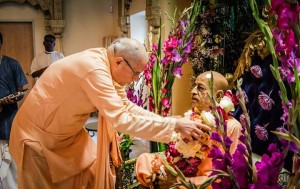 Giriraj Swami read and spoke from Caitanya-caritamrta, Madhya-lila, 22.62.
Giriraj Swami read and spoke from Caitanya-caritamrta, Madhya-lila, 22.62.
‘sraddha’-sabde — visvasa kahe sudridha niscaya
krishne bhakti kaile sarva-karma krita haya
TRANSLATION
By rendering transcendental loving service to Krsna one automatically performs all subsidiary activities. Such confident, firm faith favorable to the discharge of devotional service is called sraddah.
PURPORT
Firm faith and confidence are called sraddha. When one engages in the Lord’s devotional service, he is to be understood to have performed all his responsibilities in the material world. He has satisfied his forefathers, ordinary living entities, and demigods and is free from all responsibility. Such a person does not need to meet his responsibilities separately. It is automatically done. Fruitive activity (karma) is meant to satisfy the senses of the conditioned soul. However, when one awakens to Krsna consciousness, he does not have to work separately for pious activity. The best achievement of all fruitive activity is detachment from material life, and this detachment is spontaneously enjoyed by the devotee firmly engaged in the Lord’s service. —Cc Madhya 22.62
HH Devamrita Swami Vyasa Puja Offerings
→ simple thoughts
Every year HG Candidasa Das puts together and co-ordinates the offerings of the disciples and well wishers of my Guru Maharaja HH Devamrita Swami.
This years offerings are available online here:
http://devaswami.com/writings/from-disciples/vyasa-puja-offerings-2013
As always I am inspired by the amazing outpourings by my God Family if only my words were so inspiring but for what it’s worth this is my simple offering:
Hare Krishna
Please Accept My Humble Obeisances
All Glories to Srila Prabhupada
Dear Devamrita Swami Maharaja
Another year and another opportunity to write a small offering and again I stare at a blank page wondering what to write, words appear inadequate how does one express their feelings given all that you have done for each one of us.
The patience and tolerance shown
The words of guidance that often appears to fall on un-listening ears
Get you remain their willing and encouraging, caring and inspiring.
I remember how you challenged me all them years ago over nursing the body asking what is the benefit; they still will suffer and eventually leave their body; I remember you asking what about the soul?
You made it more personal, to the point? What are you doing to help the suffering of the soul?
Seeing your example the care of looking after the spirit soul, and seeing this reflected in your humble disciples in their actions and words.
Tolerating my irrationality, my doubts, answering each e-mail with a few words which always inspires and encourages; giving me shelter and taking me as a disciple even their showing the greatest compassion a name that reminds me of the most important weakness of mine to help focus my mind.
The simple words of thank you appears weak inadequate, my wish is may I have more of your association and loving care; but more important that your words of advice remains ever present in my mind and heart.
Yours Humbly
Dhirabhakta Das
Polyfest
→ simple thoughts
The Food For All band took to the stage last Saturday at the famous Half Moon, for a sold out gig in honour of a wonderful devotee and singer Maharani Devi or as the world knew her Polystyrene, singer with X-ray Specs.
Maharani left her body a few years ago due to cancer, but she had a great positive effect on millions of young people. She kept her spiritual life always at the forefront of her life, she is greatly missed by so many
your servant Parasuram das
HH Devamrita Swami visits Bhaktivadanta Manor
→ simple thoughts
It was with great delight that my Guru Mahraja HH Devamrita Swami came and gave class at Bhaktivadanta Manor which was warmly received and as always inspirational:
It was also an wonderful time having my Guru Maharaja lead Kirtan
The temple president Sruti Dharma Prabhu took the time to show Maharaja the George Harrison Garden:
It was also a special day as the deities here at Bhaktivadanta Manor wearing their new outfits made by over 200 devotees that attend the Manor co-ordinated and directed by one amazing mataji; high praise was given by HH Devamrita Swami who suggested that may be she should become a GCB member:
Their was also a special cake made for her amazing contribution given by the head pujari:
Meaning of Initiation
→ Servant of the Servant
Today in ISKCON, whatever little I have seen, initiation is taken seriously by aspiring devotees only up to when they get it. Of course, I don’t want to generalize but there is this tendency also among devotees today. They practice Krishna consciousness seriously to the point of initiation and then after initiation, spiritual life becomes hackneyed. But real spiritual life begins after initiation. Also, I have seen initiation is seen as a social status symbol within ISKCON and devotees have a sense of air around them. Such behavior actually is contradictory to the inner meaning of initiation.
Once initiated, the devotee actually must become more humble and tolerant and in fact aspire to seriously take the position of servant of the servant even if it is difficult. But initiated devotees (even so called senior devotees) lack the mental discipline to reject all forms of adoration, profit and distinction (materialistic qualities) thus beginning the road for downfall. So yes initiation is a serious commitment externally to practice our sadhana and internally to remain humble servants in the hands of Guru and Krishna.
Below is a transcript from a lecture about initiation given by H.H.Radhanath Swami. He captures the idea very nicely.
We should know that initiation in itself doesn't mean anything. Real initiation does not mean getting a name, sitting in front of a fire, and throwing some grains in the fire. That is not initiation. There are many people who get initiated who never got initiated…not really! It’s not something cheap. But in Kali Yuga everyone wants something cheap.
Prabhupada said don’t try to keep your guru like your dog. Don’t think your guru is just a picture to put on the wall and say this is my guru. It’s the way most people are. What does initiation mean? It means the willingness to surrender your life to following the instructions of the guru. If you are not willing to do that, initiation is a farce. It means nothing. Then we should never encourage anyone to get initiated unless they are living a life sincerely to follow the instructions. It is better to remain a congregational devotee without an initiation.
Getting initiated means following the four regulative principles strictly, if you are not following the four regulative principles strictly in this sampradaya and get initiated, it is a farce. It means nothing. If you are not willing to chant 16 rounds everyday it’s a farce! It means nothing! It’s a show bottle! It’s nonsense! We are not concerned with such show bottle nonsense cheap things. We are concerned something with substance. You are not going to back to Godhead because you are initiated. You are going back to Godhead because you surrendered to Krishna through surrendering to his pure devotees through the parampara and part of the process of that surrender is to accept initiation but it is not the end of itself.
To initiate means to begin - its beginning a higher realm of surrender if you do it right. If you don’t do it right it does not mean anything. If you are not willing to put your own ego aside to hear from the words of your guru and follow, then forget about initiation.
Initiation means a formal vow that I am going to put my ego aside and I am going to humbly follow you throughout my life with faith and if someone is actually living according to that principle then he will make real spiritual advancement and whatever spiritual advancement you make all of those connected to you will share the benefits from your spiritual advancement and eventually you will become a pure devotee – definitely! And at that time all of your descendants and all of your forefathers will be liberated for so many generations.
- H.H.Radhanath Swami, lecture - Uttara Mother In Krishna Consciousness
8 year old Jude cycled 62 miles from Oxford to London promoting cow protection and ahimsa milk (2 min video)
→ Dandavats.com
 8 year old Jude cycled 62 miles from Oxford to London for the Ahimsa Dairy Foundation, promoting cruelty-free milk production. Read more ›
8 year old Jude cycled 62 miles from Oxford to London for the Ahimsa Dairy Foundation, promoting cruelty-free milk production. Read more › A new day and an other parikrama to Vrindavana’s beautiful and sacred Mansarovar, Bhandirvan, and Baelvan (62 photos)
→ Dandavats.com
 Bhandirvan where Radha and Krishna were married by with Brahma as the priest, Mansarovar, a lake made of Radharani’s tears and Baelvan where Goddess Laxmi performed tapasya to enter into Raas-lila. Read more ›
Bhandirvan where Radha and Krishna were married by with Brahma as the priest, Mansarovar, a lake made of Radharani’s tears and Baelvan where Goddess Laxmi performed tapasya to enter into Raas-lila. Read more › Bliss in Union Buildings, Pretoria, Gauteng, South Africa with Iskcon devotees from all over the globe (29 photos)
→ Dandavats.com
 Our 3rd annual Chariot festival big success with loads of new faces. It wouldn't have been possible without your support and blessings. Read more ›
Our 3rd annual Chariot festival big success with loads of new faces. It wouldn't have been possible without your support and blessings. Read more › GITA COACHING INFO ON PREZI
→ Gita Coaching
Lovers of Krishna chant His Name in the houses and streets of Moscow (49 photos)
→ Dandavats.com
 "Glory to the Sri Krsna sankirtana, which cleanses the heart of all the dust accumulated for years and extinguishes the fire of conditional life, of repeated birth and death. This sankirtana movement is the prime benediction for humanity at large because it spreads the rays of the benediction moon. It is the life of all transcendental knowledge. It increases the ocean of transcendental bliss, and it enables us to fully taste the nectar for which we are always anxious."
Siksastaka Read more ›
"Glory to the Sri Krsna sankirtana, which cleanses the heart of all the dust accumulated for years and extinguishes the fire of conditional life, of repeated birth and death. This sankirtana movement is the prime benediction for humanity at large because it spreads the rays of the benediction moon. It is the life of all transcendental knowledge. It increases the ocean of transcendental bliss, and it enables us to fully taste the nectar for which we are always anxious."
Siksastaka Read more › And here is Mr Kapoor and the brahmana doing puja
→ SivaramaSwami.com
The chokers in question
→ SivaramaSwami.com

The power of mantras: inspired me to buy Syama a choker
→ SivaramaSwami.com





